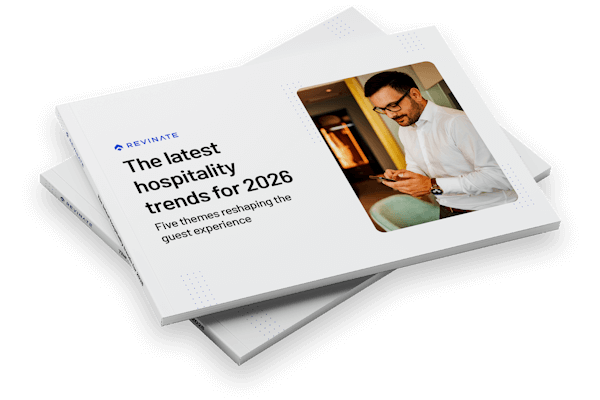Top hotel trends: Industry experts predict what’s ahead
Top hotel trends: Industry experts predict what’s ahead
Predicting the future is always a challenge, particularly when it comes to the hospitality space. Just think of how hotel trends have take shape over the years.
Until budget airlines took off in the 1970s, the idea of affordable airfare was laughable. And who would have guessed that travelers would eventually be able to do everything from booking a room to texting the front desk all from a cellphone?
But if anyone can provide an accurate glimpse into which hotel trends we can expect going forward, it’s industry veterans. Get ready for insights from hospitality experts that will help you gear up for the year ahead.
What you will see here
- Prioritizing technology will no longer be optional
- Actionable data will prove essential for driving efficiency and improving operations
- Effective data use will also enable hotels to deliver better experiences
- Solid first-party data strategies will become a key hotel trend
- Prices will normalize
- Labor challenges will remain
- Guests will seek out options to promote their well-being
- Bleisure travel will stick around
- Preferences for sustainable options will become a top hotel trend
9 hotel trends that will shape 2023
While this might not be an exhaustive list, it certainly touches on the major hotel trends that you’ll want to keep in mind as you work to improve operations, delight guests, and drive revenue.
1. Prioritizing technology will no longer be optional
It’s impossible to talk about hotel trends without mentioning technology, especially as it relates to cost savings. Recent research from CBRE shows that margins have become tighter throughout the year. And this is something that Matthijs Welle, CEO of of Mews, doesn’t see changing.
“Hotels in 2023 will see smaller margins than ever before and even less margin for error,” Welle says. “Some hotel brands took the opportunity in the past 3 years to overhaul their technology stacks, allowing them flexibility in scaling up and down their business.”
So, how many hotels are making technology a priority? As it turns out, a lot. According to a report from Duetto, nearly 78% of hotels plan to increase their tech investments in the next 3 years.
2. Actionable data will prove essential for driving efficiency and improving operations
For many hoteliers, a key piece of the technology puzzle is getting their data right. And it’s no wonder why.
“Technology and data are a big focus for hospitality right now. It touches almost every aspect of the business: guest experience, back-of-house operations, loyalty program, marketing, in-room technologies, and revenue,” explains Scott Samuels, CEO and Founder of Horizon Hospitality Associates.
While making your data actionable is easier said than done, it’s inarguably beneficial. “Those who manage to do it right will be able to drive better guest experiences, reduce the burden on staff, and cut operating costs,” says Laura Calin, Global Vice President of Hospitality and Solutions Management at Oracle Hospitality.
As for how to start using your data more effectively, it really comes down to using a robust data platform and other sophisticated tools. And you need to leverage solutions that integrate with one another.
3. Effective data use will also enable hotels to deliver better experiences
It’s easy to see how actionable data leads to greater productivity and profitability, but it also enables you to deliver far more personalized experiences. Just consider the information you glean about guests during every touchpoint.
“Each interaction generates data,” Calin points out. “In the booking phase alone, hoteliers can ascertain a guest’s market segment, source of business, rate code, day-of-week check-in, and more. All of this combines to tell a story about the guest, why they’re traveling now, and what matters most to them. As information is collected and put into action, hoteliers are better able to deliver customized experiences and offers that are unique to each individual.”
As an example, consider a guest who ignores upsells promoting family-friendly offers and also updates their preferences to indicate they mostly travel for business and are interested in restaurants. You could segment your database to create an email campaign targeting guests like this that features a promotional offer for a 15% discount at your on-property restaurant on weeknights.
4. Solid first-party data strategies will become one of the most prominent hotel trends
There are numerous types of data hotels can use. Third-party data comes from an organization that has no direct connection to you or your target audience. You can also collect second-party data — information provided to you through some sort of partnership. Lastly, there’s first-party data, which is the data you collect directly from your guests.
With companies like Google moving away from cookies that track users, it’s becoming crucial for hoteliers to focus on collecting and activating first-party data.
“The most important trend to watch next year is how hotel marketers are activating and enriching their first-party data, and what they’re getting out of it,” says Noreen Henry, CRO at Sojern. “We conducted a recent survey of hotel marketers around the world, and found that 81% of respondents saw a lift in revenue, and 57% saw an increase in guest satisfaction with their first-party data programs. We even found that those who are working with hotel technology companies feel they’re getting more out of their first-party data strategy.”
Having the right data platform makes it even easier to make use of the information you already have. Book a demo of our solution to see how it works.
5. Prices will normalize
One of the top hotel trends that customers will celebrate is the return to reasonable prices. In fact, travelers are likely going to be more budget-conscious going forward. Research from AHLA shows that nearly half of US adults rank their financial security as 5 out of 10 or lower.
“There is no possible way that leisure or business travelers will continue to pay exacerbated pricing with the level of travel we have seen in 2021 and 2022 as we came out of Covid,” says Peter Ricci, Clinical Associate Professor and Director of the Hospitality and Tourism Management Program at Florida Atlantic University. “The pent-up demand has faded and the reality of credit card bills, bottom line profits within companies, and so on will rule the day.”
This doesn’t mean that vacations are out of the question. But Joel Contor, Director of Sales and Marketing at the Kimpton Gray Hotel, notes that travelers are going to have certain expectations based on price.
“Savvy travelers will be looking to ensure their experience is up to par with the rates they are paying — the return of full amenities, housekeeping services, and food and beverage options,” Contor says.
6. Labor challenges will remain
Many of the frustrations from the Covid era are thankfully behind us, but not all of them. While staffing shortages themselves have gotten better, problems remain for many hospitality businesses.
“They are now experiencing higher-than-average turnover among the new hires,” Ricci explains. “Many are coming in for increased wages, but not sufficiently knowledgeable of the day-to-day life of a hospitality worker. Hence, they become frustrated, disenchanted, or otherwise upset early on and depart.”
What’s the solution? Start by considering the tools you use.
“Labor is still the biggest cost of any hotel, and it has been increasingly more expensive to employ and retain talent, so the only solution is through technology innovation,” Welle offers.
Offering competitive compensation is a good start, but it’s really only part of what hospitality workers care about. According to BCG, employees who’ve left the industry also departed for reasons related to self-development, workplace climate, and work-life balance. Ricci says that many HR professionals are already looking into ways to keep employees more engaged and involved.
7. Guests will seek out options to promote their well-being
Increasingly, guests are thinking about rest and relaxation when planning trips. While this focus on wellness travel began a few years ago, it’s on the cusp of truly taking off in 2023.
“There is a focus on travel for well-being, and the segment is expected to have a sustained growth,” says Aniket Sarkar, General Manager at Ananda in the Himalayas. “Global hotel brands are also expanding their footprint into wellness and adding wellness experiences in their offerings.” He also notes this includes a focus on emotional health.
Believe it or not, this is one of the hotel trends that nearly any type of property can focus on. Wellness isn’t just for high-end hotels.
“We are seeing more and more unique hospitality companies like glamping resorts and wellness retreats that solely aim to provide experiences to unplug and recharge,” Samuels says.
8. Bleisure travel will stick around
“It will be interesting to see what behavior observed during 2022 was a reaction to travel opening up versus a permanent new trend, like fewer, higher quality trips with a longer length of stay, often combining both business and leisure,” says Zachary Schwartz, CEO of YAYS.
Given some of the other cultural changes that have taken place over the last few years, it’s looking like bleisure is here to stay.
“The working week of Monday through Friday is dead,” Contor says. “With flexible working conditions at the forefront of many industries, Friday is the new Saturday, and travelers that can work remotely will for sure take advantage of longer weekend travel opportunities.”
As for how more bleisure travel could affect hotels, it’s hard to say. But seasonality as you know it may never be the same.
“Combine [the rise of the sharing economy] with the flexibility of remote work, and we might expect to see an increase in the number of travelers taking advantage of off-peak travel deals,” says Amr Shafik, Co-Founder of Getaway.
9. Preferences for sustainable options will become one of the top hotel trends
Climate change has become a focal point for people all around the world, even when they’re on vacation.
“There’s been a growing focus on sustainable tourism in recent years, and that trend is only going to continue,” Shafik says. “More and more people are interested in reducing their carbon footprint and supporting responsible businesses.”
It’s true. A recent report from Oncarbon reveals that 78% of travelers think it’s important to travel in a sustainable way, and 74% of travelers would be willing to stay somewhere more sustainable given the option.
This presents an enormous opportunity for the hotel industry. There are many options for reducing your environmental impact that guests can participate in, such as allowing them to waive housekeeping or leverage keyless entry in lieu of plastic keycards.
And if your property uses a text messaging solution like Revinate Ivy, you can even use that technology to provide guests with tips for traveling green.
Prepare for these hospitality industry trends
Now that you have a clearer understanding of which hotel trends will impact the industry this coming year, you can start taking action. Maybe that means revamping some of your email marketing practices. Or you might consider giving your technology an upgrade.
For example, you might recognize that you’re not able to effectively leverage the data you already have. In that case, it might be time to implement a new data platform. Learn more about this type of technology and how to choose the right solution by reading our article, “Data platform 101: How a hotel data platform helps your business.”
This site is protected by reCAPTCHA and the Google Privacy Policy and Terms of Service apply. View our Terms & Conditions here. *Required fields.






